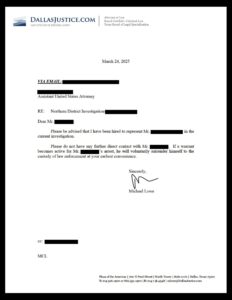Top 10 Things to Know If You Are Being Investigated by Federal Agents: Lawyer’s Recommendations
Posted on by Michael Lowe.
No arrest, no contact by law enforcement? Think you’re being watched? From a criminal defense perspective, it’s not about paranoia; it’s being prepared.
The following article dovetails with my 13 minute YouTube video, “Federal Investigations: Top 10 Do’s and Don’t List,” where I discuss the following, going into more detail on things like how detention hearings work, and changing the identity of property when someone suspects they are being investigated. See it here:
_____________
Federal investigations are different from state investigations. They are typically much longer and more in-depth. They usually involve a conspiracy. This means many more suspects, and therefore many different levels of culpability.
-
For details on the federal system, read: How Arrests Happen: From Investigation to Arraignment, Being Charged for a Federal Crime; and The Federal Criminal Justice System: After Arrest, From Arraignment to Sentencing.
Federal investigators typically identify the top targets of their investigation. They will use a variety of methods to investigate including in person interviews. Not everyone they interview is a suspect. Some people can just be witnesses. But they typically interview lower-level suspects and witnesses first and then work their way up. Whether they interview the main targets of their investigation depends on the case. See, Federal Investigations: Target Letters, Proffers, and Plea Deals.
It is very common for someone who is a target of a federal investigation to find out they are being investigated. Many times the agents want them to find out about the investigation. This can be for a variety of reasons.
Maybe the investigator wants them to hire a lawyer and then have the lawyer contact them. Maybe the investigator wants to see whether the suspect will attempt to obstruct their investigation in some way.
If the federal agent already has a good case against a target, the agent won’t really care if the target attempts to obstruct their investigation. The obstruction just ends up being another count in the indictment, a potential guideline enhancement and additional evidence of guilty, should the case go to trial.
 Past Cases: My Recommendations and Observations From 26 Years Experience
Past Cases: My Recommendations and Observations From 26 Years Experience
The follow recommendations cannot be viewed as legal advice for your case. Every case is different and deserves its own individual respect. These are simply examples taken from real cases I personally know about from my 26 years of criminal defense experience.
The only advice you should follow is the legal advice given to you by your lawyer. Nothing herein creates an attorney-client relationship in your case.
Please read my disclaimers page to clarify this article is being provided as a public service and cannot be considered as applying to any particular situation or specific individual, as well as other specifics of my firm’s legal and privacy policy.
The following are overall recommendations. Some of these items are things that are smart to do. Some of these items are just things you should know. And a few of these items are things that are wise to avoid doing if you think the feds are investigating you:
1. Your Residence: Where You Live Is Important
Don’t make any changes to your residence, live in a good stable place, and cooperate with the US probation officer during their pre-detention hearing interview. It’s always a good idea to have a stable and well know residence if you think you are about to get arrested by the feds.
I have had cases in the past where my client’s co-defendants started getting arrested and then my client decided to change his residence to his girlfriend’s house or start living in hotels in different locations. I have seen other cases where folks started traveling around the country or even to other countries once they learned about a fed investigation.
Flight Risk
Before a federal magistrate can decide about whether to release a defendant, they must know that the defendant is NOT a flight risk. The defendant will be interviewed by US Probation before the detention hearing. Cooperate with the USPO at the interview. The probation officer, in every case, is required to prepare a report concerning release or detention for your detention hearing.
If USPO cannot make a clear determination about the defendant’s residence or prospective residence, then the report won’t look good and the magistrate is very unlikely to release the defendant.
Weapons at Home
A corollary of this rule is that you should NOT possess a weapon in your residence or in any of your vehicles. Possession does not have to be physically on your person. Possession could include any place over which you control in some way. This could include storage units, trailers, cars, rent houses and boats.
2. Your Name and Identity
Don’t change name or identity. I have seen cases where a defendant, to avoid being arrested, starts using a pseudonym for various reasons. This is a red flag. Federal investigators will likely pick up on this and it will be brought to the magistrate’s attention at the detention hearing. The hearing will likely not go well in these cases.
- Also see: The Mandatory Federal Detention Provisions in the Laken Riley Act; and How to Get Out of Jail on a Federal Charge: Federal Arrest, Bail, and Pre-Trial Detention.
3. Who is Looking For You? Find Out Who the Feds Are; Consider the LOR
Find out who is looking for you. If you have been contacted by federal law enforcement or you know federal investigators are searching for you, it’s always best to find out who is searching for you and then hire a lawyer.
In these cases, I will use my contacts to find who the lead Assistant United States Attorney (AUSA) is assigned to your case. I will send them a letter that looks something like this:
You will notice that I always tell the federal prosecutor that I will surrender my client should a warrant become active. At first, this may look like some kind of admission of guilt. But it’s not. This statement will never be used against you.
I make this offer to federal prosecutors because I want to be able to show the federal magistrate later on at a detention hearing that my client is not a flight risk and he was always willing to cooperate and surrender to law enforcement. This can be used to rebut any argument made by the AUSA at a detention hearing that my client was a flight risk.
4. Make Sure You Know What’s On Your Phone
It is very common for federal agents to seize any cell phone or other electronic device from a person they arrest. Later on, the federal prosecutor will likely get a search warrant and search the device for more incriminating information.
Federal investigators and prosecutors love to make surprise arrests. They may have a variety of reasons for this. But one of the top reasons is arrest an unsuspecting target and then search their phone.
- For more, read: The Police and Your Phone: Invasion of Privacy by Police.
5. Don’t Talk to Anyone Who Has Been Arrested
If someone you know gets arrested in a federal investigation, don’t talk to them. If you know the feds raided a friend’s house or charged a friend in a federal indictment, it is very likely they hired a lawyer and they are cooperating with federal authorities against other people they know.
Even if others are not cooperating with the feds against you, federal agents are watching to see if you do anything to obstruct their investigation. If they find out you told another witness to say a certain thing to law enforcement or you threatened other people about their cooperation, they will use that evidence at your detention hearing, at trial and again at sentencing.
6. Don’t Tell Anyone You Were Arrested
If you get arrested, don’t tell anyone that you’ve been arrested. The fewer people who know about the arrest or the charges against you, the more opportunities you may have in the future to cooperate with law enforcement should that be the best course of action in your case.
Of course, it may be better to go to trial. But that’s not something you are going to know early in your case. So, it’s best to keep it a secret the best you can.
- To learn more, read: Plea Bargaining and Making Deals in Federal Felony Cases: Criminal Defense Overview.
7. Don’t Give a Statement Without Your Lawyer
If you are arrested, do not give a statement. It will never be to your benefit to do so without a lawyer’s help. If it turns out to be in your best interest to give a statement, a good lawyer can make sure that you are legally protected when you do so.
You can’t do this yourself. It will never offend a federal agent or AUSA if you choose to remain silent and hire a qualified lawyer. They see this all the time.
8. The “You Know Why We Want to Talk to You” Trick
If you are contacted in person or on the phone, never fall for the “you know why we want to talk to you?” trick. This is the oldest ones in the book but it’s still done. You should always act surprised and confused about any initial law enforcement encounter. Then you should tell the investigator/agent that you need to speak to a lawyer before you can talk.
9. Don’t Answer Search Warrant Questions
If agents are running a search warrant for your home, business or making a search incident to an arrest in your home or business, never answer any questions about electronic devices. Even if the questions seem inconsequential, do not answer.
The questions may be simple questions about who uses which device or who uses which email address. The questions may be about passwords or other login credentials. Do not answer any of these questions. Never consent to search anything.
- See: Digital Data and the Fourth Amendment Prohibition Against Illegal Search and Seizure; and Wrong House Raid: Will FBI Be Held Liable for Damages by SCOTUS in Martin?
10. Hire a Lawyer and Don’t Lie to Your Lawyer
This is the most important rule of all. If you think you are under investigation or about to be arrested by federal authorities, it’s best to have a plan to hire a lawyer if you haven’t already done so.
If you haven’t hired a lawyer, at least talk to a trusted family member about how they can help you hire a lawyer in a timely manner. This is important because detention hearings can happen in just a few days after the initial appearance in front of the federal magistrate. The more time your lawyer has to prepare for the hearing, the better the outcome will likely be.
If you get arrested on a Complaint instead of an indictment, you will also have a probable cause hearing at the same time as your detention hearing. In these cases, it’s even more important to give your lawyer as much time as possible to prepare for these hearings.
- For more, see: Federal Grand Juries in Texas: Criminal Defense; and ICE Holds, Bail Bonds, and Getting Freed From Jail in Texas.
It is possible for your lawyer to challenge the strength of the Government’s case at one of these hearings. Although the challenge won’t make the case go away, it is a factor the Federal Magistrate will consider when deciding whether to release you. Your lawyer will also have time to gather evidence and witnesses that can prove you are not a threat to the community or a flight risk. These are the factors the magistrate will care about.
Trust and Confidentiality
From the beginning, you should be as open and honest with your lawyer as possible. Everything you say to your lawyer in confidential. The government will never find out what was said. Typically, your lawyer will not receive very much discovery from the government before a detention/probable cause hearing.
It is very important that your lawyer knows how to prepare your defense, evaluate any other defenses you think you have and how to value your case. You don’t want your lawyer to put into a position where the government knows vastly more about the case than they do. The more truthful information your lawyer has early in the case, the better a job your lawyer can do for you.
On the other hand, if you lie to your lawyer, your lawyer may start making poor decisions on your behalf and poor recommendations. When your case is over, everyone will know the truth, including your lawyer.
The problem is that you will be the one who suffers the consequences of not being truthful with your lawyer from the beginning. I believe many folks try to hide the truth from their attorneys at the beginning of the case because they believe it will hurt their chances in court if they are honest. Nothing could be further from the truth.
A lawyer’s job is to objectively evaluate the case based on the known evidence. I have had many cases where my client was honest with me and admitted to a crime. But I was still able to get their case dismissed, get a grand jury no bill or a not guilty from a jury.
The defense lawyer’s job is not to judge you. You are not going to confession when you meet with your lawyer. The lawyer’s job is to get the best possible outcome in your case in an ethical and legal manner. That’s it. Just be honest and let your lawyer cook for you.
For more, read:
-
How Prosecutors Try to Maximize Punishment: Aggravating Factors in Federal Sentencing
-
Defense Mitigating Factors: Reducing Sentences in Federal Cases
______________________
For more information, check out our web resources, read Michael Lowe’s Case Results, and read, ”Pre-Arrest Criminal Investigations.”
Comments are welcomed here and I will respond to you -- but please, no requests for personal legal advice here and nothing that's promoting your business or product. Comments are moderated and these will not be published.




Leave a Reply